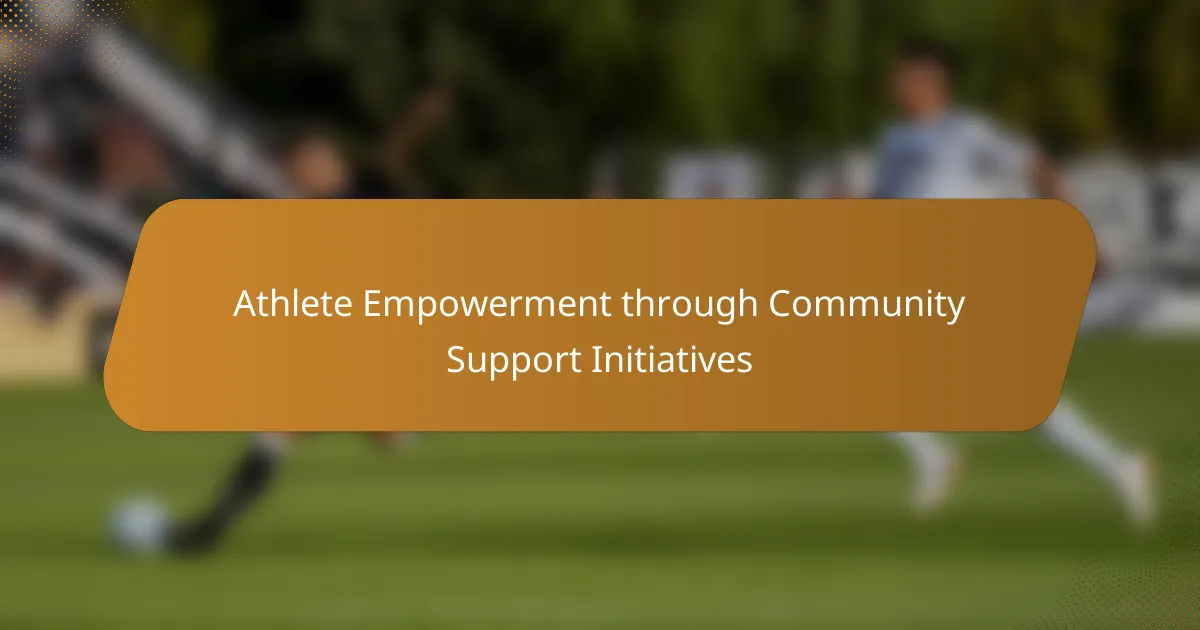Community support initiatives significantly enhance athlete empowerment by providing essential resources, mentorship, and financial backing. These programs improve mental health and resilience while fostering personal and athletic growth. Key aspects include mentorship connections, local sponsorships, and mental health resources that collectively nurture athlete development. Engaging with community initiatives helps athletes overcome challenges and achieve their personal goals.
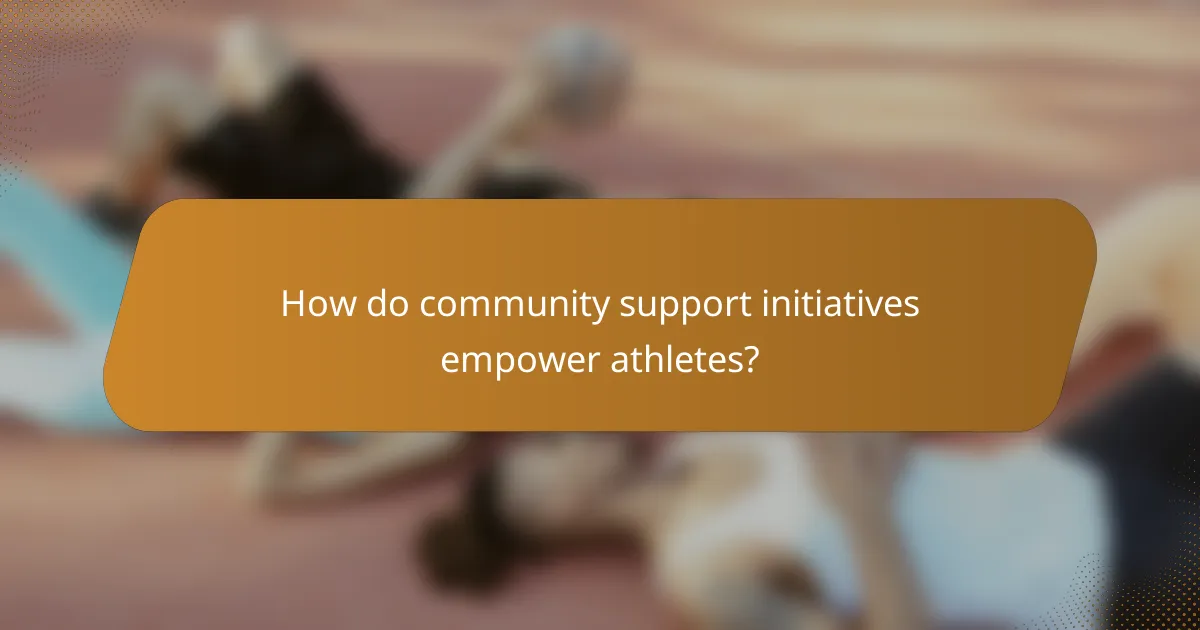
How do community support initiatives empower athletes?
Community support initiatives empower athletes by providing resources, motivation, and a sense of belonging. These initiatives enhance confidence and performance through mentorship, financial assistance, and access to training facilities. For example, programs that connect local businesses with athletes can offer sponsorships, which directly impact an athlete’s ability to compete at higher levels. As a result, athletes often experience improved mental health and resilience, fostering a supportive environment that encourages personal and athletic growth.
What are the key benefits of athlete empowerment through community support?
Athlete empowerment through community support initiatives leads to enhanced confidence, improved performance, and greater resilience. These benefits stem from strong social networks that provide emotional and practical resources. Community backing fosters a sense of belonging, motivating athletes to pursue their goals. Additionally, access to mentorship and shared experiences further amplifies personal growth and development.
How does community involvement enhance athletic performance?
Community involvement significantly enhances athletic performance by providing emotional support, resources, and motivation. Engaging with local organizations fosters a sense of belonging, which can increase athletes’ confidence and resilience. Studies show that athletes involved in community initiatives often report higher levels of mental well-being, leading to improved focus and performance during competitions. Furthermore, access to training facilities and mentorship through these initiatives can provide athletes with unique opportunities to refine their skills and strategies, ultimately enhancing their competitive edge.
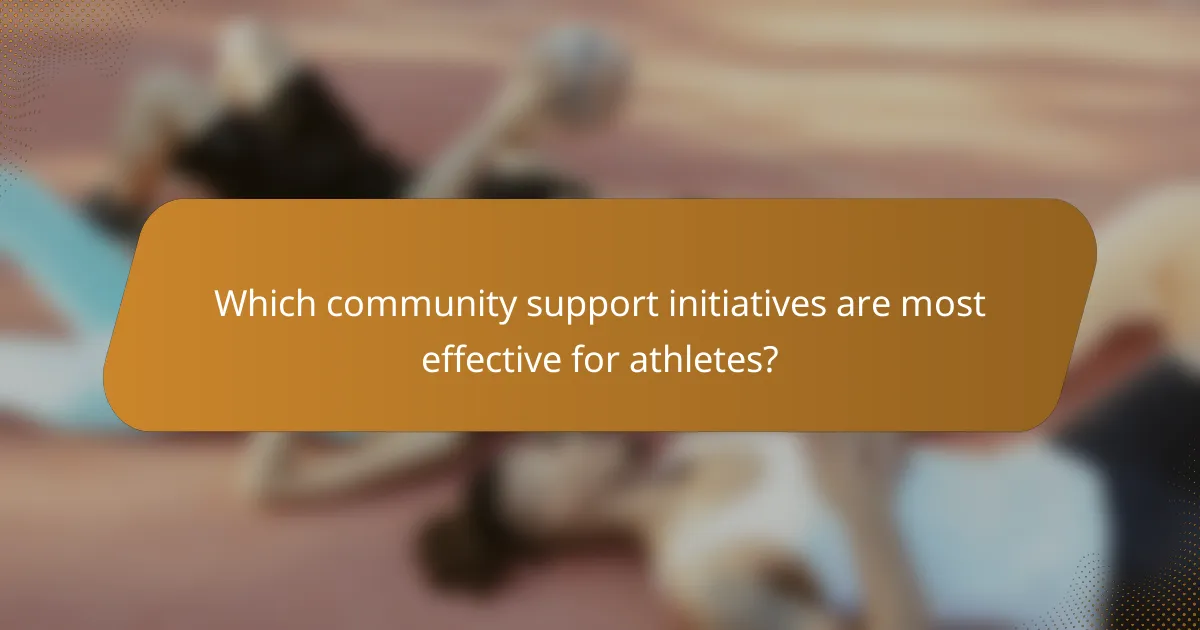
Which community support initiatives are most effective for athletes?
Community support initiatives that empower athletes are mentorship programs, local sponsorships, and mental health resources. These initiatives enhance athletes’ skills, provide financial backing, and promote overall well-being.
Mentorship programs connect experienced athletes with newcomers, fostering guidance and knowledge transfer. Local sponsorships secure funding for training and competitions, easing financial burdens. Mental health resources address psychological challenges, contributing to athletes’ resilience and performance.
As a result, these initiatives collectively create a supportive environment that nurtures athlete development and well-being.
What role do local sports organizations play in athlete empowerment?
Local sports organizations play a crucial role in athlete empowerment by providing resources, mentorship, and community support. They foster a sense of belonging, helping athletes develop confidence and skills. Through initiatives like training programs and workshops, these organizations enhance athletes’ physical and mental well-being. Furthermore, they create networking opportunities, connecting athletes with professionals and sponsors, which can lead to career advancements. This community-driven approach not only cultivates talent but also promotes inclusivity and diversity in sports.
How do mentorship programs impact athlete development?
Mentorship programs significantly enhance athlete development by fostering skill acquisition and personal growth. These initiatives provide athletes with guidance, support, and networking opportunities that promote resilience and goal achievement.
Mentorship facilitates knowledge transfer from experienced individuals, helping athletes refine techniques and strategies. For instance, studies show that athletes with mentors demonstrate improved performance metrics, such as increased win rates and enhanced mental toughness.
Additionally, mentorship programs often emphasize community support, creating a sense of belonging among athletes. This social network not only boosts motivation but also encourages collaboration and shared learning experiences.
By integrating mentorship into athlete development, organizations can cultivate well-rounded individuals who excel both on and off the field.
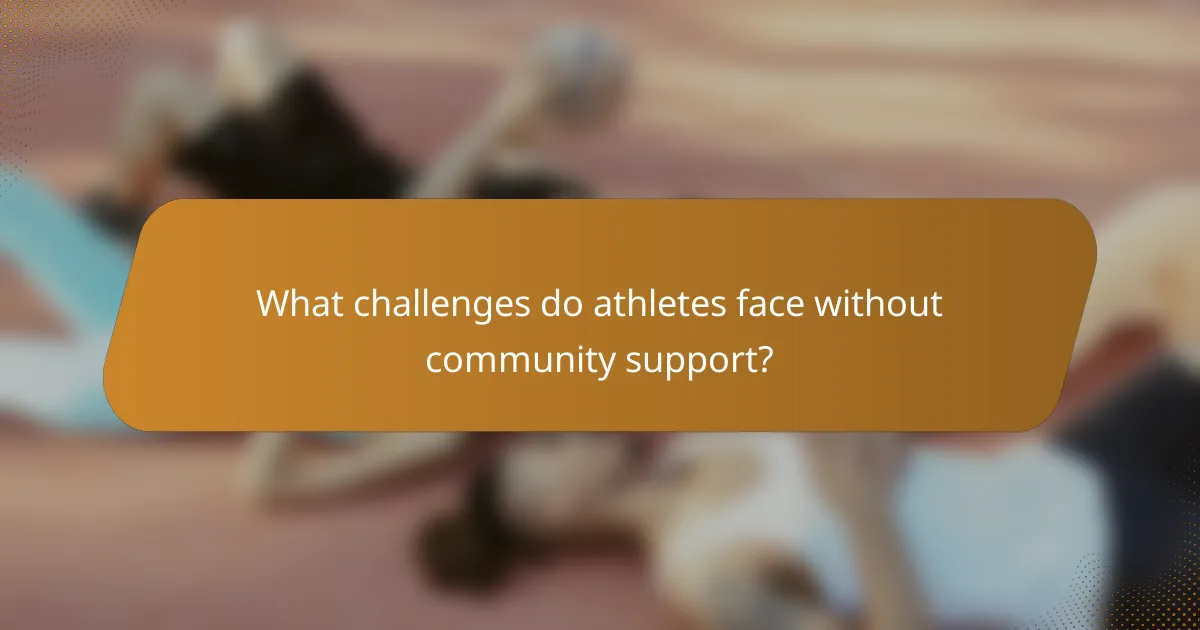
What challenges do athletes face without community support?
Athletes without community support face significant challenges, including isolation, lack of motivation, and limited access to resources. Community involvement fosters a sense of belonging, which enhances mental resilience and performance. Research shows that athletes with strong support networks experience improved outcomes in training and competition. Furthermore, community initiatives can provide funding and mentorship, addressing financial barriers and skill development.
How does lack of resources affect athlete performance?
Lack of resources significantly hinders athlete performance by limiting access to training, nutrition, and mental support. Community support initiatives empower athletes by providing essential resources, fostering resilience, and enhancing overall performance. For instance, mentorship programs can bridge resource gaps, offering guidance and motivation. Additionally, access to local training facilities and equipment through community initiatives boosts athletes’ skills and confidence. Ultimately, a supportive environment enables athletes to thrive despite resource limitations.
What barriers exist for athletes seeking community support?
Barriers for athletes seeking community support include stigma, lack of awareness, and limited access to resources. Stigma surrounding mental health can deter athletes from seeking help. Many athletes may not be aware of available community initiatives that can provide support. Additionally, geographic and financial constraints can limit access to these resources, making it challenging for athletes to engage with community support systems effectively.
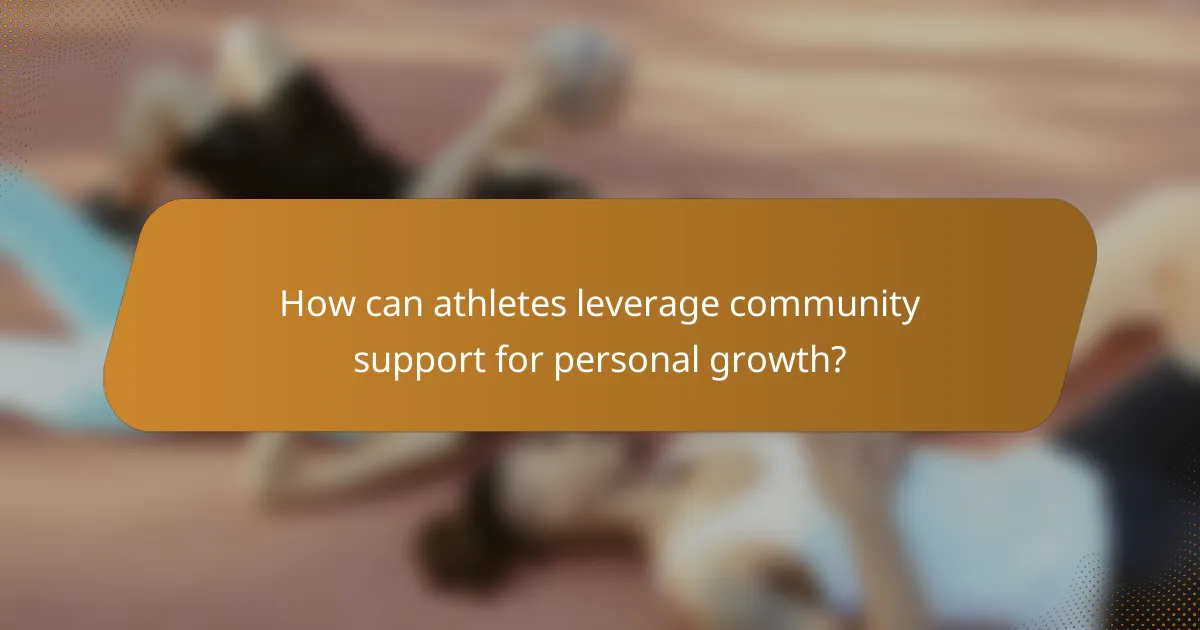
How can athletes leverage community support for personal growth?
Athletes can significantly enhance their personal growth by actively engaging with community support initiatives. These initiatives provide a network of encouragement, resources, and mentorship that fosters resilience and skill development.
Community support can manifest through local sports clubs, mentorship programs, or social media groups. For example, athletes can gain insights from experienced mentors who share their journey and strategies. This connection often leads to improved performance and mental well-being.
Moreover, participating in community events builds a sense of belonging and accountability. Athletes who feel supported are more likely to set and achieve personal goals. Research shows that social support positively impacts motivation and reduces stress.
In summary, leveraging community support empowers athletes to grow holistically, enhancing both their athletic and personal lives.
What strategies can athletes use to build a supportive network?
Athletes can build a supportive network by actively engaging in community support initiatives. They should connect with local organizations, participate in mentorship programs, and collaborate with fellow athletes to share experiences and resources. Networking through social media platforms also fosters relationships and provides access to diverse support systems. Additionally, athletes can attend workshops and training sessions to meet like-minded individuals who share their goals.
How does social media influence athlete-community interactions?
Social media significantly enhances athlete-community interactions by fostering engagement and support. Platforms allow athletes to share experiences, promote initiatives, and connect with fans. This interaction empowers athletes by creating a sense of community and shared purpose. For instance, athletes often leverage social media to highlight community support initiatives, driving awareness and participation. As a result, these initiatives can lead to increased funding and volunteer efforts, enhancing the overall impact on the community.
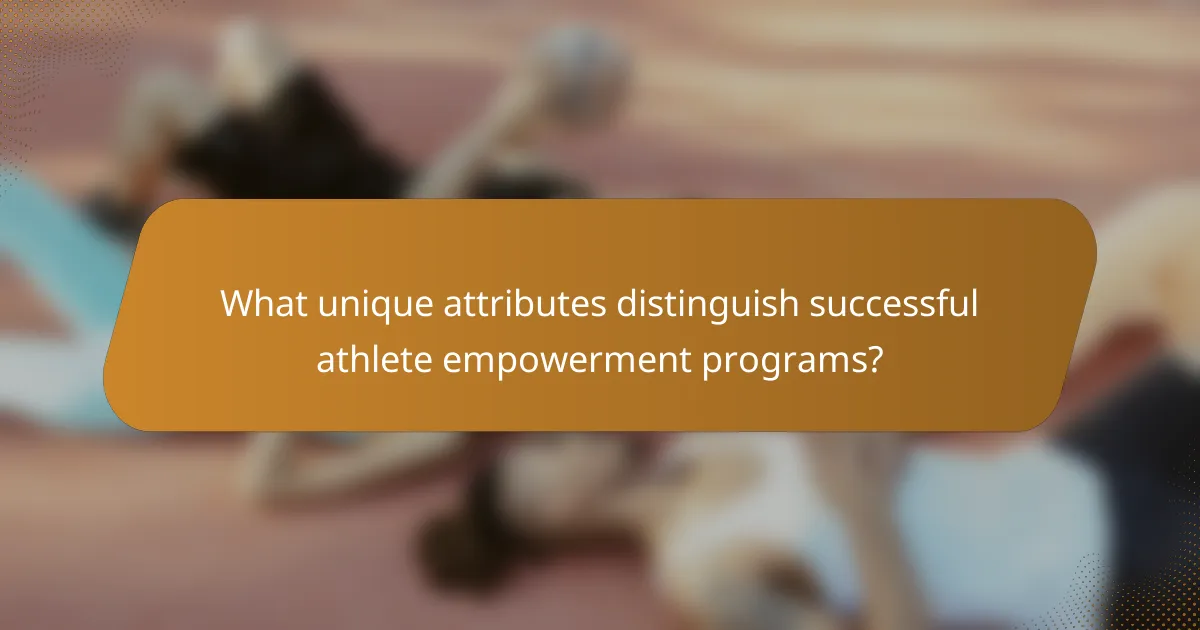
What unique attributes distinguish successful athlete empowerment programs?
Successful athlete empowerment programs stand out through personalized mentorship, community engagement, and holistic development. These programs foster resilience and confidence, addressing unique athlete needs. Tailored support enhances performance, while community initiatives promote inclusivity and collaboration. Unique attributes include a focus on mental health resources and adaptive training methods, making programs effective in diverse environments.
How do cultural factors shape community support initiatives?
Cultural factors significantly influence community support initiatives for athlete empowerment. These initiatives often reflect local values, traditions, and social norms, fostering a sense of belonging. Community engagement varies based on cultural contexts, affecting the resources allocated and the types of support provided. For instance, cultures that prioritize teamwork may emphasize collaborative training programs, while others might focus on individual achievements. Additionally, unique cultural narratives can inspire initiatives that address specific community needs, enhancing athlete motivation and participation.
What innovative approaches are being used in different regions?
Innovative approaches in athlete empowerment through community support initiatives include mentorship programs, grassroots funding, and collaborative training spaces. Regions are leveraging local resources to enhance athlete engagement and development. For instance, community-driven sports academies in urban areas provide tailored training and support, fostering local talent. Additionally, partnerships with schools and local businesses create sustainable funding models, allowing athletes to access necessary resources without financial burdens. These initiatives not only uplift individual athletes but also strengthen community ties, promoting a culture of support and encouragement.
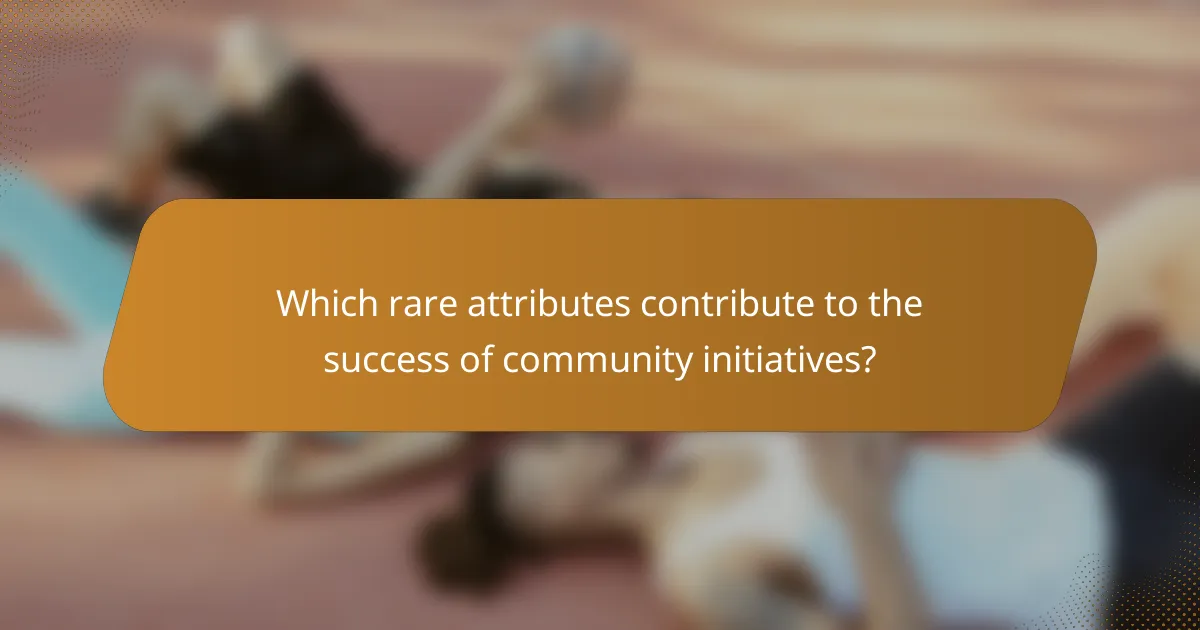
Which rare attributes contribute to the success of community initiatives?
Rare attributes that contribute to the success of community initiatives include unique local partnerships, tailored support programs, and innovative engagement strategies. These elements foster stronger connections and enhance participation among athletes. For instance, initiatives that adapt to specific community needs often see higher success rates. Additionally, leveraging local resources can create a sense of ownership and commitment, leading to more sustainable outcomes.
What uncommon partnerships have led to significant athlete empowerment?
Uncommon partnerships like those between athletes and local businesses have significantly empowered athletes through community support initiatives. Collaborations with non-profits and educational institutions have also created platforms for athletes to advocate for social change. These partnerships often result in increased visibility, resources, and support networks that enhance athletes’ overall impact. For example, initiatives that connect athletes with youth programs foster mentorship opportunities, promoting both personal growth and community engagement.
How do elite athletes give back to their communities?
Elite athletes give back to their communities through various support initiatives. They engage in mentorship programs, fund scholarships, and promote health and wellness activities. These efforts empower youth and foster community development. For example, athletes often partner with local organizations to create sports clinics, enhancing access to athletic training. Their involvement not only inspires but also provides resources that uplift underprivileged communities.
What best practices can be adopted from successful initiatives?
Successful initiatives in athlete empowerment through community support adopt several best practices. These include fostering collaboration among local organizations, engaging athletes in decision-making, and prioritizing mental health resources.
Collaboration enhances resource sharing and maximizes impact. Engaging athletes ensures initiatives are relevant and effective. Prioritizing mental health addresses a critical aspect of athlete well-being, leading to improved performance and satisfaction.
Furthermore, implementing mentorship programs connects experienced athletes with emerging talent. This builds a supportive network and encourages knowledge transfer. Regular feedback mechanisms allow for continuous improvement, ensuring that initiatives adapt to changing needs.
Lastly, celebrating achievements fosters a sense of community and motivation among athletes. These practices collectively create a robust support system that empowers athletes to thrive.
